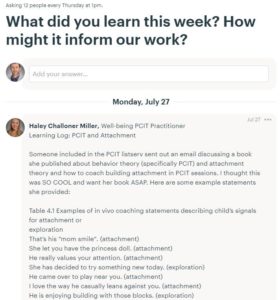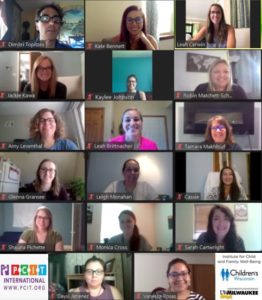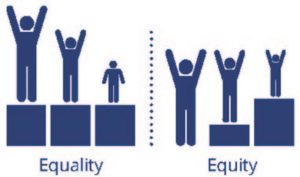The mission of the Institute for Child and Family Well-Being is to improve the lives of children and families with complex challenges by implementing effective programs, conducting cutting-edge research, engaging communities, and promoting systems change.
The Institute for Child and Family Well-Being is a collaboration between Children’s Wisconsin and the Helen Bader School of Social Welfare at the University of Wisconsin-Milwaukee. The shared values and strengths of this academic-community partnership are reflected in the Institute’s three core service areas: Program Design and Implementation, Research and Evaluation, and Community Engagement and Systems Change.
In This Issue
- Meet the ICFW – Well-being Lead Clinicians Kate Bennett and Leah Cerwin
- Research and Evaluation
- Program Design and Implementation
- Recent and Upcoming Events
- Recent Publications
Meet the ICFW
Kate Bennett, LCSW, is a Well-Being Lead Clinician and serves as a lead mental and behavioral practitioner at Children’s Wisconsin and the Institute for Child and Family Well-Being. She has recently shifted to providing direct clinical services primarily via telehealth in response to the COVID-19 pandemic. In her role, Kate routinely delivers community-based and therapist training workshops rooted in evidence-based interventions such as Parent-Child Interaction Therapy (PCIT). As a PCIT International Level 2 Trainer candidate under the Trauma and Recovery Project (TARP), a Category III SAMHSA grant, she is continuing to co-facilitate some of the very first virtual trainings for new PCIT therapist and PCIT Level 1 trainer cohorts statewide throughout the summer.
Kate is passionate about leveraging technology to promote equitable access for families receiving prevention and treatment services. In June, she began pursuing her doctorate in social work at the University of Kentucky and is focusing her capstone on PCIT training and dissemination.
Leah Cerwin, LCSW, is a Well-Being Lead Clinician with Children’s Wisconsin and the Institute for Child and Family Well-Being. Leah is a Parent Child Interaction Therapy Certified Level 1 Trainer and has worked to provide a PCIT virtual training to clinicians across the state this summer. Along with providing services to families herself, Leah also conducts co-therapy over telehealth with PCIT trainees who she co-trained in the fall of 2019 and assisted in transitioning their cases to telehealth services. Leah provides consultation video calls for PCIT clinicians, and works closely with PCIT Level 2 and global trainers to help develop new PCIT training processes. Leah also co-trained a cohort of PCIT clinicians in a virtual Level 1 training this summer and provides consultation for these Level 1 trainer candidates as they begin training clinicians within their own agencies. Leah participated in a virtual PCIT Toddlers training this past spring. Leah also manages a Category 3 SAMHSA grant, in which she promotes the development of strategies to improve assessment processes for evidence-based treatments PCIT, TF-CBT, and CPP.
While in graduate school, Leah interned with the Institute for Child and Family Well-Being directors and University of Wisconsin-Milwaukee faculty, Drs. Dimitri Topitzes and Joshua Mersky, to develop Project Connect, a group-based pilot of PCIT. Leah then helped pioneer PCIT and Project Connect at Children’s Wisconsin.
Research and Evaluation
The Institute accelerates the process of translating knowledge into direct practices, programs and policies that promote health and well-being, and provides analytic, data management and grant-writing support.
Building an Institutional Memory
Strategic Learning inspires and guides future direction from the failed attempts and successful outcomes of past efforts. The use of a strategic learning process supports an organizational culture committed to continuous quality improvement and collective growth and knowledge. Being a learning organization serves multiple purposes: creating institutional memory, supporting just-in-time iteration, and clarifying our hypotheses about our work. Engaging every staff member in these learning practices allows us to make our thinking visible to each other, strengthening our hypotheses and uncovering hidden assumptions.
The Institute’s Children’s Wisconsin team developed a Strategic Learning process and set of tools in early 2019. While many of those tools serve a formal decision-making, planning or evaluation function, Learning Logs are our platform where we share insights and reflections on work that we’re doing – from the clinic to meetings to thoughts that arise in the course of writing, reading, or meeting new people. Learning Logs serve a knowledge management function, and allow us to share and track how our thinking and work with others and within our systems evolve over time.

Our Learning Log process is rather simple and can be replicated easily by other groups and organizations. We start with two questions that we are asked to answer each week:
- What did you learn this week?
- How might it inform our work?
These questions land in our inboxes each week through an Automatic Check-in through Basecamp. We then proceed to Basecamp and post our answers with the following basic expectations:
- Header – Topic of Learning (i.e. Systems Change, Clinical Services, Social Innovation, etc.);
- Brief synopsis of what was learned and how it relates to/informs our work;
- Link to the source material(s) (i.e. Article, Podcast, Speaker, etc.)
Once the posts are submitted, they are shared with all team members for review and are archived on our Basecamp page as institutional memory. We can interact with one another’s Learning Logs by adding comments, questions, recognition or engaging in further learning by exploring the source material links.
Since we started this process last year, our small team of ten has completed more than 500 Learning Logs on topics ranging from integrating clinical services into the child welfare system to the importance of lived experience in social innovation to systems drivers and evaluation. The content of the Learning Logs has served as a consultative space for the team, a catalyst for deeper, more targeted conversations in supervision, and the development of a virtual learning resource center on Basecamp that our team can refer to for future use.
While the Learning Logs are intended to be driven by each individual’s learning and relevant areas of interest, we have developed Focused Learning Logs that have a specific topic that is currently relevant and urgent in our practice and culture. In 2019, we focused on our practice, use of tools and strategies around Trauma Focused Cognitive Behavioral Therapy (TF-CBT) to develop a toolkit for fellow practitioners and families that receive TF-CBT. This year, we are focusing on Anti-Racist and Inclusion, Diversity and Equity issues and efforts that impact our clinical practices, systems, policies, and organizational culture. In addition to providing a sharper focus on our own education and reflection in these critical areas, it also serves as an opportunity to understand where everyone on the team is in their learning, which leads to increased empathy, support and constructive conversation on the team.
We believe that ongoing learning is happening daily throughout our organizations, but often occurs without sufficient reflection or documentation that lend themselves to growth – both personal and organizational – and future reference and use. Learning Logs have served as a powerful tool that help us capture and enhance our learning, growth, and potential for continuous improvement.
Learn More:
Practice Brief: ICFW Strategic Learning
The Power of Inquiry in Disruptive Times – Tamarack Institute
Practice Brief: ICFW After Action Reviews
Program Design and Implementation
The Institute develops, implements and disseminates validated prevention and intervention strategies that are accessible in real-world settings.
Virtual Clinician Training and COVID-19
By Kate Bennett & Leah Cerwin
In the previous ICFW newsletter, our team shared a few of the ways that our work has changed in response to the COVID-19 pandemic. One area of focus for our mental and behavioral health practitioners has been the implementation of virtual training. In March, clinicians at Children’s Wisconsin and the ICFW were recipients of Parent-Child Interaction Therapy –Toddlers (PCIT-T) training facilitated by Dr. Emma Girard. In July, we were able to flip the script and provide one of the very first web-based PCIT Level 1 Trainer and PCIT Therapist trainings in the country alongside PCIT Global Trainer, Dr. Christy Warner-Metzger.

Traditionally, the standard for PCIT training facilitation has been in-person workshops; however, physical distancing is an important step the ICFW is taking to slow the spread of COVID-19. Attending to the guidelines released by PCIT International, Dr. Warner-Metzger, Dr. Dimitri Topitzes, Kate Bennett, and Leah Cerwin strategically planned and facilitated an 8-hour web-based Level 1 PCIT training and the first half of a web-based 40-hour PCIT therapist training supported by the Trauma & Recovery Project.
As agencies continue the provision of telehealth services that allow clinicians to engage with families remotely, internet-PCIT (I-PCIT) delivery was included as a highlighted didactic skill. Recommendations for safe implementations of in-person PCIT services for agencies who cannot provide telehealth were also discussed.
Along with adapting to telehealth strategies for PCIT Clinicians, PCIT trainers made space during virtual training for rich discussion of anti-oppressive strategies for delivering PCIT. This was done both by providing information and updates on how PCIT International as an organization is taking steps to create a more inclusive and Anti-Racist Space for therapists, trainers, and families, and also by allowing the trainees themselves the opportunity to discuss the cultural sensitivity and tailoring necessary to make PCIT an approach better suited to meet the needs of their families of color.

PCIT trainers discussed how PCIT as an organization utilizes The Equity Approach, to ensure that everyone has the opportunity to participate and prosper when building strategies to improve community health. By understanding and acknowledging disparities and privilege, the PCIT organization is creating a more inclusive and anti-racist model.
Additionally, the Trauma and Recovery Project, a grant managed by ICFW PCIT Trainers, seeks to recruit and train clinicians of color to build a more diverse clinician pool, and PCIT trainers encouraged trainees to voice how PCIT practices could be tailored to meet the needs of the diverse families in the Milwaukee community that are served by Children’s Wisconsin.
The ICFW team is truly passionate about expanding evidence-based treatments like PCIT for kids and families throughout Wisconsin. We are excited to welcome our newest PCIT Level 1 Trainer and PCIT Therapist candidates:
2020 PCIT Level 1 Trainer Candidates
Jacqueline Kawa, Ph.D. (Children’s Wisconsin – Milwaukee)
Robin Matchett-Schmidt, LCSW (Children’s Wisconsin – Racine/Mount Pleasant)
2020 PCIT Therapist Candidates
Leah Brittnacher, Ph.D. (Advocate Aurora Health – Brown County)
Tamara Makhlouf, LPC (Children’s Wisconsin – Milwaukee)
Kaylee Johnson, MSW Candidate, APSW (Children’s Wisconsin – Racine/Mount Pleasant)
Shauna Pichette, LPC, NCC (Family Service of Waukesha)
Sarah Cartwright, LPC, ATR (Family Service of Waukesha)
Leigh Monahan, Ph.D. Candidate (Next Step Clinic – Milwaukee)
Cassie Matejka, Ph.D. Candidate (Next Step Clinic – Milwaukee)
Amy Leventhal, Ph.D. (Next Step Clinic – Milwaukee)
Glenna Gransee, Ph.D. Student (Next Step Clinic – Milwaukee)
Daysi Jimenez, MSW, APSW (Next Step Clinic – Milwaukee)
Monica Cross, CAPSW (Dodge Country Health and Human Services)
Vanessa Rosas LPC-IT (Sixteenth Street Community Health Center – Parkway/Milwaukee)
Learn More
Children’s Wisconsin Telehealth: Video Visits
Recent and Upcoming Events
The Institute provides training, consultation and technical assistance to help human service agencies implement and replicate best practices. If you are interested in training or technical assistance, please complete our speaker request form.
ICFW Webinars:
Upcoming – August 20th
Register here: Strategic Learning and Social Innovation in Times of Uncertainty
Past Webinars
April 8th
Evaluating Systems Change: An Inquiry Framework For Uncertain Times
April 16th
Authentic Community Engagement: Made in Milwaukee
May 4th
Making the Unspeakable Speakable: Making a Case for Trauma Screening and Assessment
May 20th
Parent Child Interaction Therapy in Child Welfare
June 17th
Trauma Screening, Brief Intervention and Referral to Treatment (T-SBIRT): An Introduction
July 30th
Housing as a Pathway to Prevent Child Maltreatment
Trainings:
July 2, 6-10
Trauma-Focused Cognitive Behavioral Therapy (TF-CBT) Learning Collaborative – South Milwaukee
August 7, 10-14
Trauma-Focused Cognitive Behavioral Therapy (TF-CBT) Learning Collaborative – Wausau
July and August
PCIT Initial Therapist Training (Virtual)
Recent Publications
Choi, C., Mersky, J. P., Janczewski, C. E., Plummer Lee, C., Davies, W. H., & Lang, A. C. (in press). The Childhood Experiences Survey: Replication study of an expanded assessment of adverse childhood experiences. Children and Youth Services Review.
Beckert, T. E., Plummer Lee, C., Albiero, P. (in press). Reaching Adult Status Among Emerging Adults in United States, Italy, and Taiwan. Journal of Cross-Cultural Psychology.
Plummer Lee, C., Mersky, J. P., Marsee, I., & Fuemmeler, B. (in press). Child maltreatment and marijuana use in adolescence and early adulthood. Development and Psychopathology.
Zhang, L., Mersky, J. P., & Topitzes, J. (in press). Adverse childhood experiences and psychological well-being in a rural sample of Chinese young adults. Child Abuse & Neglect.



